Chatter Marks
Chatter Marks is a podcast of the Anchorage Museum, dedicated to exploring Alaska’s identity through the creative and critical thinking of ideas—past, present and future. Featuring interviews with artists, presenters, staff and others associated with the Anchorage Museum and its mission.
Episodes
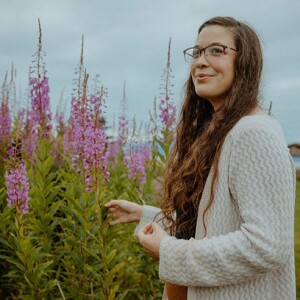
Thursday Jan 11, 2024
EP 78 Deconstructing the myth of The Last Frontier with Kaitlin Armstrong
Thursday Jan 11, 2024
Thursday Jan 11, 2024
Kaitlin Armstrong is the host of The Alaska Myth, a podcast that deconstructs the stories created during the Russian settlement and European colonization of Alaska that began in the mid-1700s. Utopian settler stories, stories of the rugged outdoors, ones of monetary opportunity and ones of lawlessness. These stories — often embellished or completely fabricated — have informed the Alaskan identity and sense of place for generations. Meanwhile, overlooking or ignoring the history and the lifeways of the many Alaska Native cultures. Kaitlin says that she’s been thinking about all of this for years, about how the idea of The Last Frontier is subtle and insidious because of what it hides. On the surface, these stories are ones of can-do spirit and gritty individualism, stories that reinforce our idea of Alaskan pride. But underneath all of that, there’s violence, resource extraction and the erasure of Native peoples and their cultures.
Kaitlin grew up in Homer, Alaska. She says she had an idyllic upbringing in the small, tight-knit community. But her understanding of what goes into creating this idyllic place changed over the years. That the land had to be conquered first and then it could be made into the place she grew up in. That knowledge and curiosity extended to her own Honduran heritage, of which she knew little about as a kid. Because, for so long, it was just too difficult for her mom to talk about. But every summer, Kaitlin’s grandma would visit and she would connect with her heritage through her. But, Kaitlin says, she always felt more Alaskan than anything else.
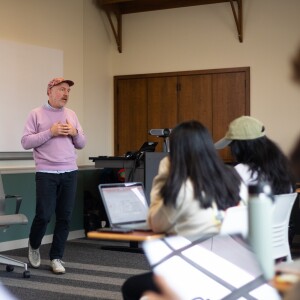
Wednesday Dec 13, 2023
EP 77 The history of slime with Christopher Michlig
Wednesday Dec 13, 2023
Wednesday Dec 13, 2023
Christopher Michlig is a visual artist and a professor at the University of Oregon, and he recently released a book titled File Under: Slime. In it, he traces the origins of the idea of slime back to the early 1900s, with associations to ectoplasm, femininity, and sexuality. In his research, he found that people like HP Lovecraft and John Paul Sartre helped solidify the concept of slime within philosophy and pop culture, paving the way for it to be an analog, or a proxy, for describing the unknown. In the 1950s, for example, there were movies like The Blob, representing the social anxiety surrounding the atomic bomb. And then in the 1980s — with movies like The Stuff, Street Trash, and The Toxic Avenger — slime represented a fear of toxicity or the handling of toxic waste. Christopher says that what we choose slime to represent evolves over time. More recently, it has entered rap music through artists like N.O.R.E, from Capone-N-Noreaga, and newer guys like Young Thug. The way these rappers are using the word “slime” is different than how it’s been used in the past. It’s positive, it’s a substitute for friend or homie.
He grew up in Girdwood, Alaska, in the ‘80s. He remembers it being a small town back then, maybe about 400 to 500 people. It’s a place that instilled in him the idea of closeness and the importance of a supportive community, sentiments that continue to inspire and influence him. Recently, he’s been doing research on different Aleutian communities, trying to get a better grasp on his family history. He has roots, on his dad’s side, in the Aleutian Islands, before the Russian fur trade. He says it’s been a difficult process, that it’s confusing for him because of the complicated history of Aleutian communities as a result of colonialism and the displacement that occurred during and after World War II. How people who had been living in a place for generations were forced to upend their ancestral ways of living. So, he tries to imagine — even project himself — to the time of his ancestors on the Island of Unga. Without much oral history from his own family to go off of, his research is helping him better understand where he comes from.
Photo by Ilka Sankari

Friday Dec 01, 2023
EP 76 What we’ve been through is not who we are now with Travante Williams
Friday Dec 01, 2023
Friday Dec 01, 2023
Professional basketball player Travante Williams says that everything in his life started with the environment he grew up in, in East Anchorage. There was good and there was bad. However, at times, the bad seemed to overshadow the good. His family, and many other people he grew up around and even looked up to, struggled with addiction and were in and out of prison. So, he had a fear of falling into that same cycle. A few people took him out of that mindset though. One was his mom. She always instilled in him a sense of his potential. Even throughout her own troubles, she made sure he knew he was loved and meant for better things. The other person was his grandmother. She was the most instrumental part of his life, Travante says. Every moment he was around her, she made him feel at home. To this day, her love and influence reminds him of all the work you need to put in to have anything that’s worth having.
His path to playing pro basketball has been one of perseverance, luck and opportunity. He tells this story from his college days that encapsulates all of this. He was working at a 24-Hour Fitness and he noticed these guys running the court during his lunch break. So he got in there and started showing everyone up. Meanwhile, a scout for San Francisco City Junior College was watching him. So, afterwards the scout approached Travante and got his number. Six or seven months later, Travante was offered a position on the team.
For the last seven years, he’s been living overseas and playing pro ball. He started his career in Tskaltubo, a city in the country of Georgia. Then he moved to Portugal, first playing for U.D. Oliveirense and then Sporting de Portugal. He says that, as a teammate, he has what he calls a dishwasher mindset. He likes to do the dirty jobs and he likes to work hard. That’s his way of leading by example. He tries to connect with all his teammates because, at the end of the day, this is a job and when one of them succeeds, they all succeed.
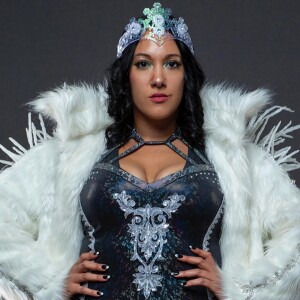
Saturday Nov 11, 2023
EP 75 From middle school teacher to pro wrestler with Freya the Slaya
Saturday Nov 11, 2023
Saturday Nov 11, 2023
Professional wrestler Sarah States, better known as Freya the Slaya, says that she’s always gone by Freya, that her wrestling character, or gimmick, started out as more of a viking and then it transitioned to an Arctic Amazonian woman — tall, strong and assertive. The Queen of the North. And it all started in Palmer, Alaska. She’s from Fairbanks, so she would have to drive six hours to Palmer to do shows in places like train depots. The shows were small, like the Alaska wrestling scene at the time, and more often than not they were performing in front of families. It was fun, an entertaining hobby while Freya was also working as a middle school teacher. She loved teaching, but she encountered too many roadblocks in her work. Resources were always limited and her empathic nature predisposed her to wanting to do more for her students. Years of this took its toll on her mental health, until one day she decided to quit her job, sell her house and move to the states. There, she threw her whole self into becoming a pro wrestler.
She says that, more and more, she’s becoming her character. That her full-time job is being Freya the Slaya, even outside of the ring. She’s training, doing interviews, working on her merch store, making social media posts, she’s on Cameo. And this personality swap, it’s in her benefit. When she’s in the ring, for example, and she’s on live TV, where so much of the performance is improvisational, it’s easier to react naturally to the violent soap opera happening all around her. That’s what continues to draw her to pro wrestling, the physical and emotional rollercoaster of it all. And how it affects its audience, that when it’s done successfully and powerfully you can see it take people away from their every day troubles and immerse them into this fantastical world of wrestling.
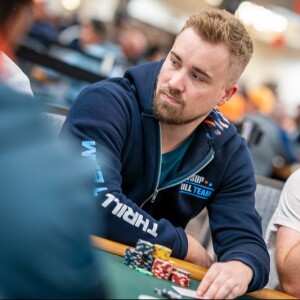
Monday Nov 06, 2023
EP 74 Embracing the variance of poker with Adam Hendrix
Monday Nov 06, 2023
Monday Nov 06, 2023
Adam Hendrix is a professional poker player. He learned to play when he was a kid, at his grandma’s house in Homer, Alaska. Every time he would visit, he’d play penny poker with his aunts and uncles, but what really got him interested in it was the first time he watched the ESPN World Series of Poker Main Event coverage. It was filled with these unique characters — boisterous and stone-faced — sometimes wearing funny hats, headphones, sunglasses or costumes. It was a career unlike any he’d ever heard of before.
Fast forward to college and he’s playing $5 poker games in his dorm at Virginia Tech. There, he had a solid group of friends he’d play poker with. Sometimes they would travel to play poker too, they’d go to places like Atlantic City where they would play until all their chips were gone. Some days they would do better than others. Poker’s unique in that way, Adam says, if you can afford the buy-in, then you can play. And because of that, you get so many different people — from beginners to experts — that come to the table every day.
He says that his upbringing contributed to his worldliness and his understanding of people — both of which are essential qualities in a poker player. His dad worked in oil, so his family traveled a lot, living in a number of different states and countries. In high school, he lived in Egypt. It was an experience that introduced him to a lot of different people and cultures. Looking back on it now, he says that his time in Egypt made him the poker player he is today. Because, after all, poker is also a game of psychology. The better you can read people, the more formative a player you’ll be.
Photo courtesy of Omar Sader
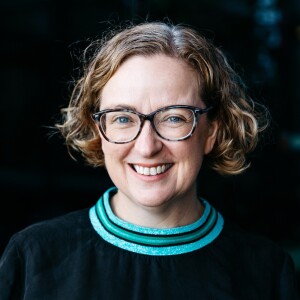
Wednesday Oct 25, 2023
Wednesday Oct 25, 2023
Kristin Alford is a futurist and the director of the Museum of Discovery, or MOD., in South Australia. She says that MOD.’s main objective is to showcase innovative research that imagines multiple futures. This idea of imagining multiple futures involves anticipating where society and nature might be headed based on past and current trends. She says that it’s about understanding and recognizing opportunities, risks and downsides, and then thinking about the unintended consequences or possible actions that can be taken. In showcasing these futures, MOD. hopes to inspire young people to learn more about where technology, ethics and social issues might be headed so that they can make better decisions for their own futures.
When putting together an exhibition, one of MOD.’s main tenants is for people to leave with a feeling of hope, not one of anxiety or depression. Because these are big issues they’re tackling — populating other planets, climate change, the future. Next year, they’re opening an exhibition called Broken, about the general feeling of anxiety and ambivalence about the future. In order to instill hope in this exhibition, people are asked a series of questions based on psychologist Charles Snyder’s Elements of Hope: “Do you have a positive vision of the future that brings you forward?” “Do you feel positive about that vision?” “Do you feel like you have agency to make a difference?” And, “Are there multiple pathways for you to reach your goal?”
In this Chatter Marks series, Cody and co-host Dr. Sandro Debono talk to museum directors and knowledge holders about what museums around the world are doing to adapt and react to climate change. Dr. Debono is a museum thinker from the Mediterranean island of Malta. He works with museums to help them strategize around possible futures.
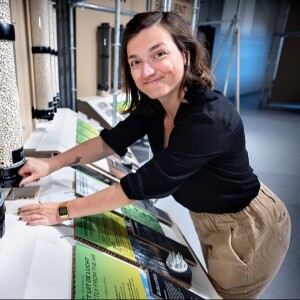
Thursday Oct 12, 2023
Thursday Oct 12, 2023
Until recently, Lizzy Bakker was the senior exhibition maker at NEMO Science Museum in Amsterdam. NEMO is all about interacting with science and technology in order to better understand the world around us, to make its visitors curious about the mechanisms that shape their lives. It turns out, exhibition design conveys a lot. Research carried out by NEMO found that if an exhibition has an unsustainable look and feel to it — ultimately an unsustainable design — then people won’t take the message seriously. So, it’s important for them to work toward creating exhibitions that are as sustainable as possible.
Right now, NEMO is focused on sustainability and the climate crisis. This year, staff came together to create The Green Team, a cohort dedicated to putting sustainability high on the museum’s agenda. Among other things, this means creating sustainable exhibitions — reusing parts of previous exhibitions for future ones, for example. It also means helping to create exhibitions that talk about the climate crisis. Currently they have an interactive exhibition called Energy Junkies where you can make decisions about the world’s energy system that will determine a more or less sustainable future. The idea is for people to understand the climate crisis and how energy production is related to it, and the different solutions that are available for individuals, businesses and governments.
In this Chatter Marks series, Cody and co-host Dr. Sandro Debono talk to museum directors and knowledge holders about what museums around the world are doing to adapt and react to climate change. Dr. Debono is a museum thinker from the Mediterranean island of Malta. He works with museums to help them strategize around possible futures.
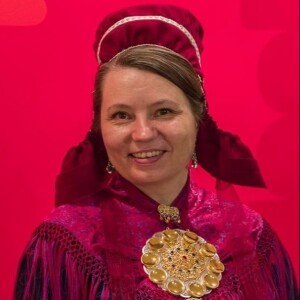
Saturday Sep 23, 2023
Saturday Sep 23, 2023
Anne May Olii is the Director of the largest Sámi museum in Norway, RiddoDuottarMuseat. The museum manages photographs, art and information on Sámi cultural heritage. Anne May says that the museum is thinking 100, 200 years into the future, about how what they’re documenting today will affect and inform Sámi people in the future. For example, the vitality of reindeer husbandry — something the Sámi people have been practicing for generations — is a concern. On top of climate change causing diminishing grazing areas, the Norwegian government is taking land from the Sámi people by putting things like windmills and power lines on their land.
Anne May says that the museum is focused on documenting these changes, to keep a record of the past and the present in order to inform the future. That there’s a strong possibility that northern countries will be looked at for guidance in a future affected by climate change. She has a vested interest in Norway. In addition to her work at the museum, she’s a farmer, her husband is a reindeer herder, her kids are farmers and reindeer herders, and she’s of Sámi heritage.
In this Chatter Marks series, Cody and co-host Dr. Sandro Debono talk to museum directors and knowledge holders about what museums around the world are doing to adapt and react to climate change. Dr. Debono is a museum thinker from the Mediterranean island of Malta. He works with museums to help them strategize around possible futures.


